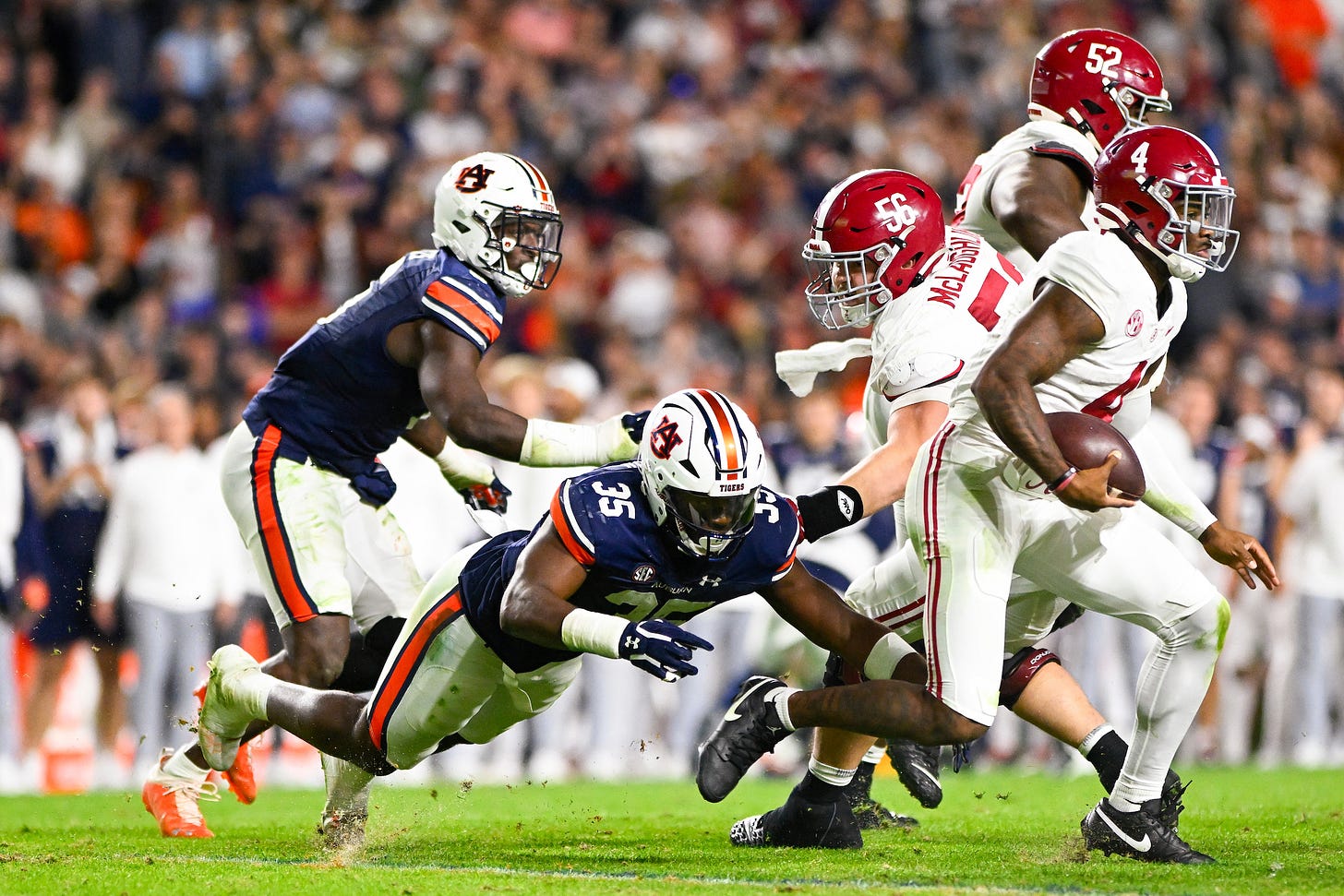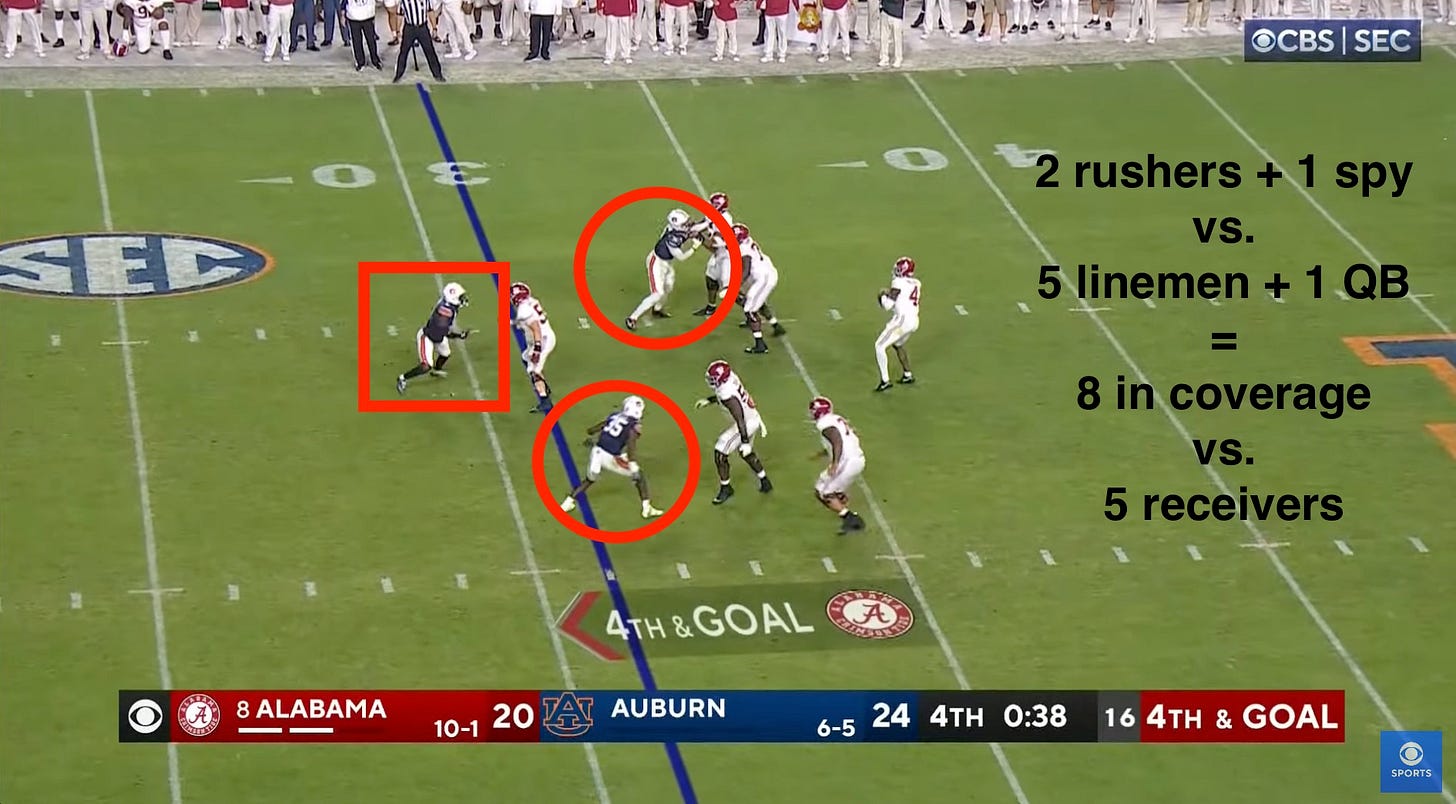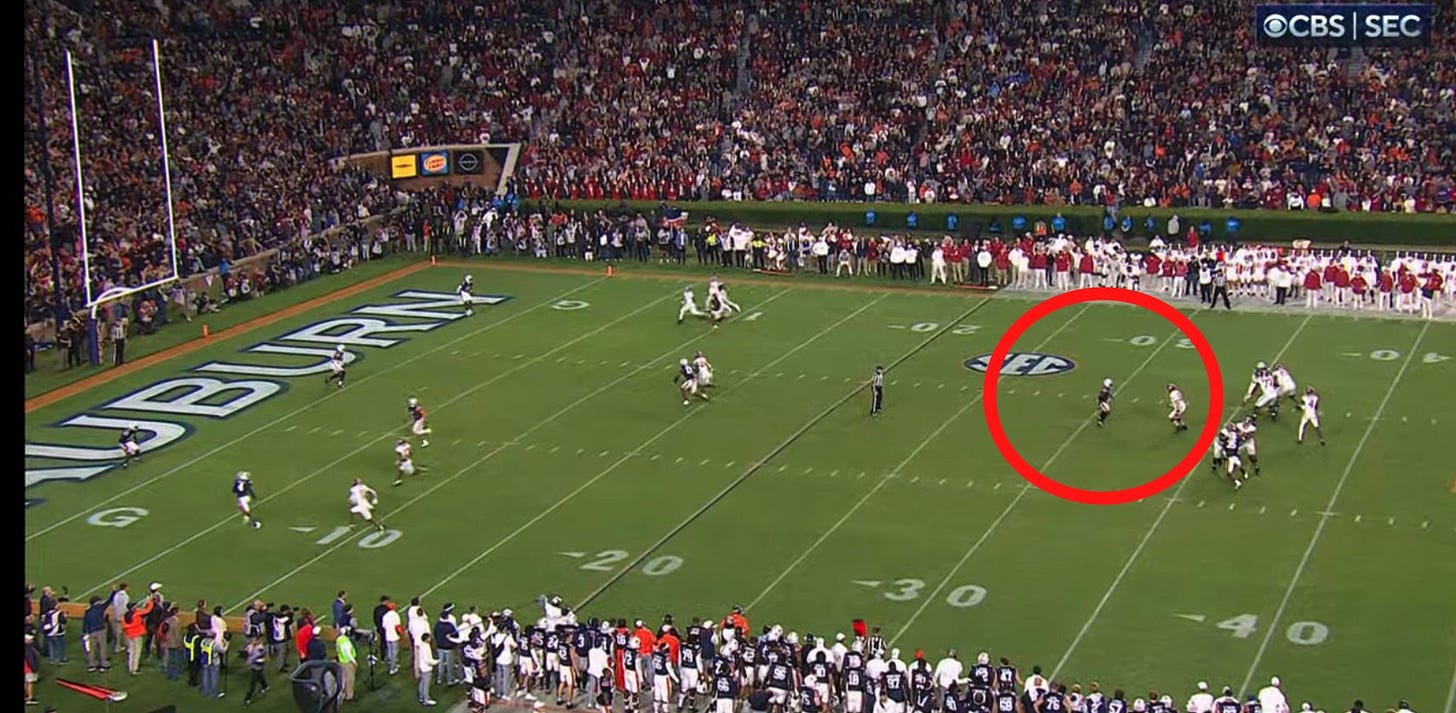Observations: Alabama 27, Auburn 24
Once again, Auburn should have upset Alabama in a home Iron Bowl. But this late loss was even more improbable than the rest.
(Jamie Holt/Auburn Tigers)
No one should have been completely surprised that Auburn had a real chance to beat Alabama in the Iron Bowl, despite losing by three touchdowns to New Mexico State last weekend.
And no one should have been completely surprised that Alabama still ended up beating Auburn, despite needing to score a touchdown on a fourth-and-goal from the 31.
The result — Alabama 27, Auburn 24 — and the touchdown that decided it were proof of two truths about the Tigers in the long term and the short term.
First: Iron Bowls played in Jordan-Hare Stadium, more often than not, are in a class of their own. Seemingly devoid of context year in and year out, this game feels like it’s a different sport than the rest of the college football season.
Second: Auburn has shown on the field this season that it’s not massively behind its rivals. But the 2023 Tigers haven’t been able to finish the job against them, finishing on the wrong end of high-stakes plays in the final minutes.
“We didn’t play good enough in the critical moments,” head coach Hugh Freeze said. “… It really came down to those few plays in a game like this.”
This Iron Bowl was just an extreme example of both truths about these Tigers.
“This right here is war, you know?” edge rusher Jalen McLeod said. “One of the oldest rivalries, best rivalries in the country. … When you lose, it's the worst feeling, especially like that. So it's nothing compared to (the previous losses). It’s deeper.”
Auburn’s defense got not one, but two three-and-outs in the fourth quarter to help preserve a 4-point lead. But the Tigers only got one first down on offense after the first one, and a muff from non-regular punt returner Koy Moore gave the Crimson Tide new life after the second one.
Alabama marched all the way inside the Auburn 10 before some Jordan-Hare Stadium voodoo returned. Jalen Milroe didn’t catch a second-down snap and lost 18 yards, followed by an illegal forward pass that backed Alabama up five more before fourth down.
Auburn just needed to stop a fourth-and-goal from the 31. The Tigers even called timeout to get their defense set. But Milroe still, somehow, found Isaiah Bond in the back corner of the end zone for the game-winning touchdown.
Most of the Jordan-Hare Stadium crowd that was one play away from getting ready to storm the field again could only watch in muted frustration. Auburn wasn’t going to win this Iron Bowl, and Alabama was going to keep its national championship hopes alive for another week after delivering the ultimate gut punch to its rival.
“I've never been part of something like that — was so close and just slipped away,” quarterback Payton Thorne said. “I'm still just kind of shocked right now, honestly.”
Like the Georgia game earlier this season, it was impressive to see Auburn play a heated, four-quarter game with an ultra-talented rival after falling so flat a week earlier. But the Tigers couldn’t make enough plays late against the Bulldogs, and they were cruelly on the end of two massive, game-defining plays against the Tide.
The gap between Auburn and the two rivals that are playing for the SEC title next week in Atlanta might not be as big as everyone thinks.
But the important gaps on the scoreboard — especially in a season where you had them both at home, unlike 2024 — are the ones that go into the record books and the ones that sting for a long time.
“Me personally, I’d probably cut off a few toes to win this game,” safety Jaylin Simpson said. “It hurts real deep. It’s going to hurt for a while.”
Here are four big Observations, along with the Nerd Stats and the Quote of the Night, from Auburn’s 27-24 loss to Alabama.
(CBS Sports/YouTube)
What happened on fourth-and-goal from the 31?
It’s going to go down as one of the most memorable and improbable plays in Iron Bowl history, and it’s one that left Auburn with more questions.
After Milroe’s botched snap and illegal forward pass, Alabama needed a 31-yard touchdown pass to essentially win the game. According to Game On Paper, Alabama’s win probability before the snap was just 4.3%.
Following a timeout, Auburn decided to go with two down linemen and an inside linebacker spying Milroe. That gave the Tigers eight defenders back to defend the throw against five Tide receivers. The play call looks like some variation of man coverage for all five of Alabama’s targets, plus three deep safeties.
(Alex Kirshner/Twitter)
The defensive call here raises several questions.
First, why did Auburn elect to send just two pass rushers after Milroe? The Crimson Tide needed to go 31 yards to score, so why not send more pressure after and force Milroe to get rid of it quicker? After all, defensive coordinator Ron Roberts has been known throughout his career for creatively generating pass rushes.
“I should have rushed better,” said McLeod, who was one of the two rushers on the play. “We had a spy. We were worried about him getting out.”
While McLeod obviously wanted to take some of the blame for the last play as a veteran defender, it’s not reasonable to expect him to get home there. A two-man rush against five players in protection rarely, if ever, works out — the players can get double-teamed and still have an extra offensive lineman to spare.
The decision to spy Milroe, who would have had to run 31 yards and get through an entire defense that was mostly looking right at him, is also a peculiar one. Milroe ran for more than 100 yards in this game and was hard to bring down, but running the ball for that distance is much more difficult than throwing it that far. Against this call, Milroe had all the time he needed to find Bond.
After the game, Freeze defended the decision to send two, spy one and drop eight.
“I mean, you can second-guess it,” Freeze said. “You’ve just got to play with vision. We’ve got nine guys back there. Just play with vision and make a play on the ball and knock it down. … I mean, you can pressure him and then you’ve got one-on-ones and they throw it up. You can do that if you want.
“I like the call. I just think we’ve got to sit back there with vision and knock the ball down.”
While many will debate the merits of the conservative pass-rushing call, Freeze does have a point: Auburn still had three more defenders back there than Alabama had receivers. It’s like a shorter Hail Mary at that point.
“Stay deep,” Simpson said, when asked about the fourth-down call. “Just keep the ball in front of you. I knew we were rushing two, so we knew he was going to have a lot of time to scramble back there. But the main point was to stay deep, keep it in front of you and bat the ball down.”
But the pass from Milroe to Bond ended up being a one-on-one jump ball between him and cornerback D.J. James — who had done well and made several crucial plays Saturday. This time, Bond won.
“D.J. had a hell of a game,” McLeod said. “ And, you know, with corners, people just look at that one play.”
James might be able to argue that Bond pushed off to create the space for his acrobatic touchdown. Freeze mentioned that James felt that way after the play.
Still, Auburn only sent two, spied one and dropped eight in coverage so it could have a numbers game on the throw downfield. James was the only defensive back who could have made a play there and Bond got behind all that prevent coverage.
All of that came together for an improbable loss that will stick in the hearts and minds of the Tigers and their fans for a while.
The mystery behind the muffed punt return
Keep reading with a 7-day free trial
Subscribe to The Auburn Observer to keep reading this post and get 7 days of free access to the full post archives.




